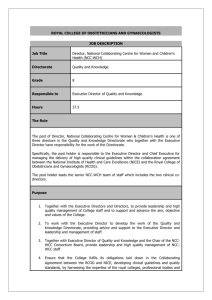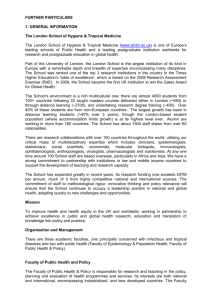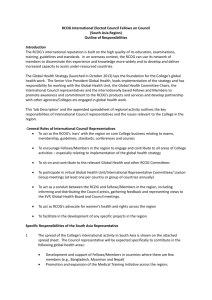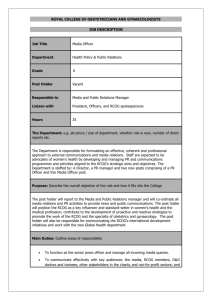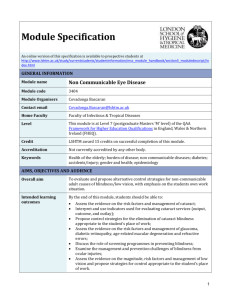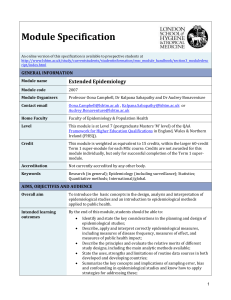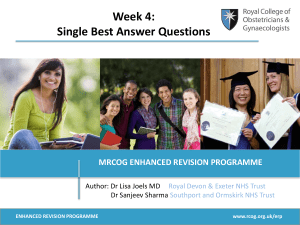Job Description - Jobs at LSHTM
advertisement
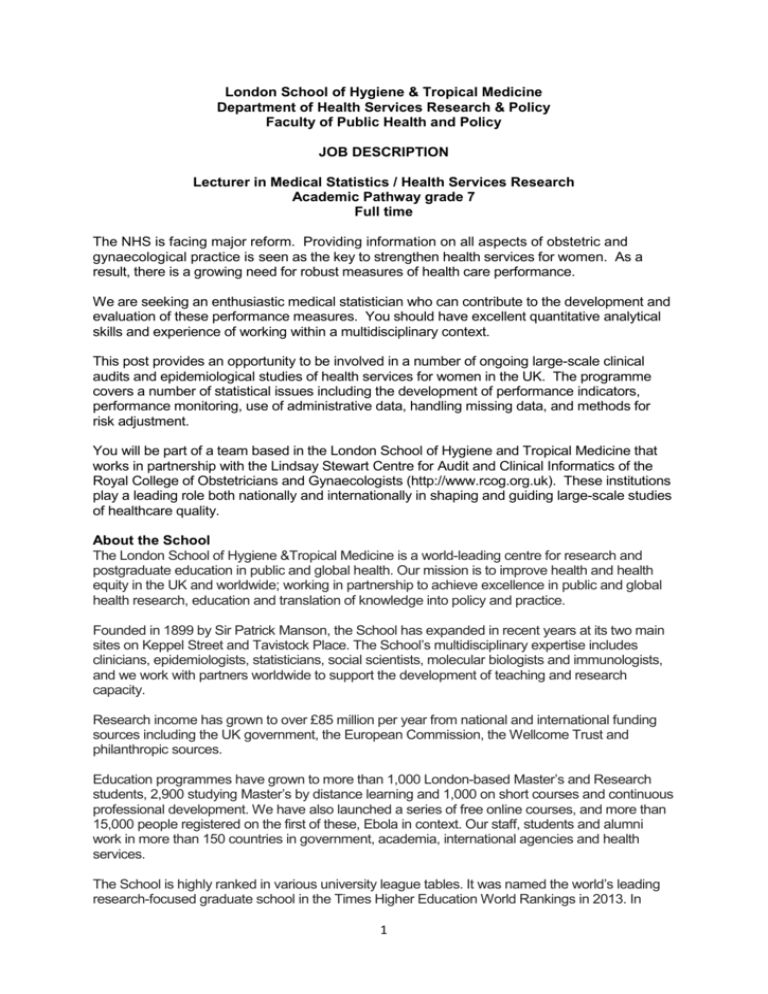
London School of Hygiene & Tropical Medicine Department of Health Services Research & Policy Faculty of Public Health and Policy JOB DESCRIPTION Lecturer in Medical Statistics / Health Services Research Academic Pathway grade 7 Full time The NHS is facing major reform. Providing information on all aspects of obstetric and gynaecological practice is seen as the key to strengthen health services for women. As a result, there is a growing need for robust measures of health care performance. We are seeking an enthusiastic medical statistician who can contribute to the development and evaluation of these performance measures. You should have excellent quantitative analytical skills and experience of working within a multidisciplinary context. This post provides an opportunity to be involved in a number of ongoing large-scale clinical audits and epidemiological studies of health services for women in the UK. The programme covers a number of statistical issues including the development of performance indicators, performance monitoring, use of administrative data, handling missing data, and methods for risk adjustment. You will be part of a team based in the London School of Hygiene and Tropical Medicine that works in partnership with the Lindsay Stewart Centre for Audit and Clinical Informatics of the Royal College of Obstetricians and Gynaecologists (http://www.rcog.org.uk). These institutions play a leading role both nationally and internationally in shaping and guiding large-scale studies of healthcare quality. About the School The London School of Hygiene &Tropical Medicine is a world-leading centre for research and postgraduate education in public and global health. Our mission is to improve health and health equity in the UK and worldwide; working in partnership to achieve excellence in public and global health research, education and translation of knowledge into policy and practice. Founded in 1899 by Sir Patrick Manson, the School has expanded in recent years at its two main sites on Keppel Street and Tavistock Place. The School’s multidisciplinary expertise includes clinicians, epidemiologists, statisticians, social scientists, molecular biologists and immunologists, and we work with partners worldwide to support the development of teaching and research capacity. Research income has grown to over £85 million per year from national and international funding sources including the UK government, the European Commission, the Wellcome Trust and philanthropic sources. Education programmes have grown to more than 1,000 London-based Master’s and Research students, 2,900 studying Master’s by distance learning and 1,000 on short courses and continuous professional development. We have also launched a series of free online courses, and more than 15,000 people registered on the first of these, Ebola in context. Our staff, students and alumni work in more than 150 countries in government, academia, international agencies and health services. The School is highly ranked in various university league tables. It was named the world’s leading research-focused graduate school in the Times Higher Education World Rankings in 2013. In 1 2014, it was ranked in the top 10 universities in the world for citation rate by the new EU-supported U-Multirank database, fourth in the world for impact in medical sciences by the Leiden Ranking and third in the world for social science and public health in the US News Best Global Universities Ranking. According to the results of the UK government’s Research Excellence Framework, published in December 2014, the School was ranked second overall (after the Institute for Cancer Research) on the key measure of impact. Mission To improve health and health equity in the UK and worldwide; working in partnership to achieve excellence in public and gloabl health research, education and translation of knowledge into policy and practice. Organisation and Management There are three academic faculties, one principally concerned with infectious and tropical diseases and two with public health (Faculty of Epidemiology and Population Health; Faculty of Public Health and Policy). Faculty of Public Health and Policy The Faculty of Public Health & Policy is responsible for research and teaching in the policy, planning and evaluation of health programmes and services. Its interests are both national and international, encompassing industrialised, and less developed countries. The Faculty has three research departments: Health Services Research and Policy Global Health and Development Social and Environmental Health Research Each department is multidisciplinary containing about 100+ academic staff representing medicine, statistics, epidemiology, sociology, economics, anthropology, operational research, psychology, nursing and history. Each department is responsible for its own research. The School has adopted a rotating system of management for its academic departments and faculties. The management of a department is under the control of the Department Head, appointed by the Director of the School for a period of three years in the first instance. The Faculty Head is appointed in a similar manner but for an initial period of up to five years. Teaching The Faculty of Public Health and Policy is responsible for organizing a one year Master's courses in Public Health, which allows students to take a general MSc in Public Health, or to follow one of the following streams: Health Services Management, Health Promotion, Environmental Health or Health Services Research. The Faculty also jointly teaches MSc Public Health in Developing Countries and MSc Control of Infectious Disease (with the Faculties of Infectious and Tropical Diseases and Epidemiology and Population Health), and MSc Health Policy, Planning and Financing (with the LSE). Master's courses are organised in a modular format across the whole School. One of the growing areas of Faculty teaching is in the distance-based MSc in Public Health, introduced in 2005/6, and Global Health Policy, introduced in 2011/12. The Faculty has also reorganised and expanded its research degree (MPhil/PhD, DrPH) training. Currently, there are about 130 students and staff members registered for a research degree. Department of Health Services Research and Policy The aim of the Department is to carry out research that helps to improve the quality, organisation and management of health services and systems. This extends from 2 establishing what care should be provided and how services should be organised, through assessing the quality of existing services, to how improvements can be brought about. Most of the research is in high income countries and, in particular, the UK. Our staff reflect both the multi-disciplinary (epidemiology, public health, sociology, psychology, economics, statistics, social and public policy) and multi-professional nature of our work (http://www.lshtm.ac.uk/php/hsrp/index.html). Establishing what care should be provided and how services should be organised involves primary evaluative research (on particular health care interventions and policies), reviews of existing research evidence and modelling possible options. In addition to specific projects, we run the Clinical Effectiveness Unit at the Royal College of Surgeons of England, support a similar Department at the Royal College of Obstetricians & Gynaecology, as well as host the Department of Health-funded Health Reforms Evaluation Programme (http://www.lshtm.ac.uk/hsru/hrep/). Further, the Department is home to the Policy Innovation Research Unit (http://www.piru.ac.uk), the Policy Research Unit for Commissioning and the HealthCare System (http://www.prucomm.ac.uk/about-us), and the LSHTM hub of the NIHR School for Public Health Research. The Department is part of the School’s European Centre on Health of Societies in Transition (ECOHOST) (http://www.lshtm.ac.uk/ecohost/) which, in turn, is a major partner in the WHO-funded European Observatory on Health Systems and Policies (http://www.euro.who.int/observatory). The Royal College of Obstetricians and Gynaecologists The College is a professional body dedicated to the encouragement of the study and the advancement of the science and practice of obstetrics and gynaecologists. Obstetrics and gynaecology were recognised as separate specialties in the mid 19th century and an independent College was founded in 1929. Currently, the College has more than 11,000 Fellows and Members of which about 6,000 are based in the UK. To fulfil its role, the College aims to improve and maintain standards in the practice of obstetrics and gynaecology, to educate medical practitioners, and to promote study and research. Since 2006, the Department of Health Services Research & Policy has worked in partnership with the Royal College of Gynaecologists and Obstetricians and is a partner organisation in the Lindsay Stewart Centre for Audit and Clinical Informatics, based at the RCOG. A similar collaboration exists with the Royal College of Surgeons (www.rcseng.ac.uk/surgical_research_units/ceu). This partnership with the RCOG has created a national centre of expertise in methods, organisation, and logistics of large-scale studies of the quality of gynaecological and obstetric surgical care. It has fostered collaborative links with numerous NHS organisations, the Department of Health, and relevant regulatory bodies. Currently, the partnership includes six staff members, four of whom are academic staff members of the School with a multidisciplinary background (health services research, epidemiology, medical statistics, and public health). Many projects led by the partnership straddle clinical audit and research. Clinical audit is a means of quality assessment, focusing on the structure, process and outcome of care. The objective of clinical research on the other hand is to provide answers to questions that directly or indirectly contribute to defining what is best practice. In addition, methodological research is required to solve the many challenges of handling large clinical databases. There is a need to refine and further develop the statistical techniques that take the specific clinical context into account. The use of administrative data and patient-reported outcome measures are other areas of interest. Duties of the post The duties of the post will reflect the work programme that will be delivered under the partnership agreement between the School and the RCOG. The work programme will be 3 agreed with the RCOG’s Lindsay Stewart Committee for Audit and Clinical Informatics. The post will be located in the Department of Health Services Research and Policy and the RCOG as required to deliver the work. While working at the RCOG will comply with any directions of the RCOG Executive Director of Quality and Knowledge. Up to 15% of available time will be spent on teaching and all the remaining time on research. Research carry out research on health care quality assessment, including the development of performance indicators, performance monitoring, use of large clinical and administrative databases, record linkage, handling missing and noisy data, methods for risk adjustment and statistical modelling; analyse data of national clinical audits and other large scale research studies; publish in peer-reviewed and prestigious journals as well as in other appropriate media; contribute to the development of bids to obtain additional research funding for the partnership between the School and the RCOG; communicate research findings through international and national conferences, mass media and through close engagement with clinicians, national policy makers and health care managers as appropriate to particular projects. Teaching participate in the teaching programme of the Faculty of Public Health & Policy, LSHTM (up to 15% of available time) which may include acting as a tutor to MSc students and organising a Teaching Module; supervise up to three research degree (MPhil/PhD; DrPH) students registered at the LSHTM and be a member of several Advisory Committees for other students; undertake a management task at Department, Faculty or School level; facilitate any other activities that will help to achieve the Department of Health Services Research & Policy's objectives; provide and update quarterly a personal page on the School’s website; contribute to the life of the School by participating in committees and other group activities. Person specification Essential: PhD or equivalent in statistics, health services research, epidemiology, or a related discipline; Experience in independently carrying out statistical analyses of complex data sets; Experience in using advanced statistical techniques such as multiple regression analyses and propensity score matching; Proven ability to write up and communicate findings; Proven ability to teach. Desirable: Knowledge and experience of health care quality assessment and audit; Knowledge and experience of multilevel modelling and Bayesian analysis, and multiple imputation of missing data; Experience in using administrative health datasets; Experience in data linkage; Experience of post-graduate teaching; Experience of liaising with stakeholders and clinicians. 4 Accountability The post-holder will be responsible to Professor Jan van der Meulen, the Head of the Department of Health Services Research & Policy, the Head of the Faculty of Public Health & Policy and, ultimately, the Director of the School. Salary and conditions of appointment In accordance with current LSHTM policy, the post will be a full-time appointment for a fixed period ending 31 March 2019. A review will be undertaken at the end of the first year in accordance with the School's performance review policy. Salary will be on the Lecturer scale, Academic Pathway grade 7 (£43 312 - £49 582 pa including London weighting) depending on qualifications and experience. Asylum and Immigration The School will comply with the Immigration, Asylum and Nationality Act 2006, which requires all employees to provide documentary evidence of their legal right to work in this country prior to commencing employment. Please be aware that you will be required to bring your passport (and visa if applicable) to interview so that it can be copied and verified. For posts requiring a recognised degree level or equivalent qualification, and where there is no suitable UK or European Economic Area candidate, the School will take the necessary steps to secure UK Border Agency permission for a foreign national to take up employment. Should a candidate require a Certificate of Sponsorship in order to take up a post they will need to meet the UK Border Agency Tier 2 Points Based Criteria. A self assessment tool can be found on the UK Border Agency website at: www.ukba.homeoffice.gov.uk/pointscalculator A candidate may also be required to undertake an English Language test prior to commencing work at the School. Details of Home Office approved tests can be found at: www.ukba.homeoffice.gov.uk/sitecontent/newsarticles/pbsapprovedenglishlanguage Further information on the eligibility criteria for Certificates of Sponsorship can be found at: www.ukba.homeoffice.gov.uk/employers/points 5

